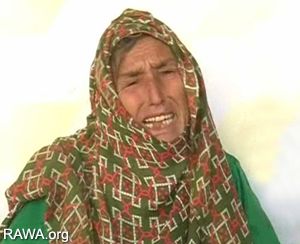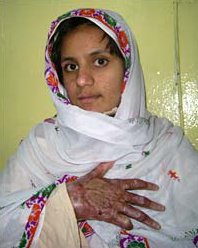By Sharmeen Obaid-Chinoy in Kabul
Glass lifts carry people up to the second floor of the shopping mall where gold jewellery and Levi's jeans are being sold in bright new stores. A large poster of a woman in a miniskirt hugging a man is plastered outside a shoe store while music blares from the mall's speakers. But outside, just around the corner, women are begging on the streets. They are the hidden face of modern Kabul.

Gulsha, suffering widow, mother of 11-year-old Sanobar who accuses Malom Zafar (district chief) and Commander Mehmood, a local warlord, for kidnapping her daughter who later was raped and exchanged for a dog. (RAWA photo)
Movie Clip of Gulsha | RAWA report
Walking the streets of Kabul under a full burqa, the traditional garment that the Taliban insisted that women wear and which many still do, it is possible to gain access to Afghanistan's forgotten women.
There are two million war widows in Afghanistan, and their plight is easy to forget in Hamid Karzai's capital, where Western-style shopping malls, bars and French restaurants are opening up for wealthy foreign aid workers and Afghan expatriates.
Every morning Gul, who was widowed when an American bomb hit her house in 2001, leaves her two daughters to go begging on the streets of Kabul. "If I'm lucky, I'll make about 50 afghanis (80p), enough to buy two pieces of bread," she says.
Kabul, it is said, is the widows' capital of the world. As many as 50,000 women like Gul live in the city, and many make their home in the abandoned buildings that dot the suburbs, often living in horrific conditions. In a nation with a fractured infrastructure and, at £125 a year, one of the lowest per-capita incomes in the world, many widows are left without relatives able to take them in or offer even modest financial support.
Gul's blue burqa at least affords her some dignity. "The men hurl abuse at me, they make indecent gestures and I'm always being harassed, but at least they cannot see me," she says.
There is no social security system in Afghanistan. Widows are not provided pensions or housing so there is no safety net for them to fall back on. In other Muslim countries, getting remarried can resolve the economic problems of widows. But in Afghanistan's that is not so. Most Afghan men do not want to bring up children from a previous marriage.
"They are fiercely protective of their wives and the mere thought of them being married before is an insult to their honour," says Maria Akrami, a social worker who runs a small NGO in Kabul.

Gulsoom is 17-years-old and married. Last year she tried to commit suicide - she failed. She set fire to herself but, against the odds, survived with appalling injuries.
(BBC News, Dec.7, 2006)
On the southern edge of Kabul, among the rubble and bombed-out buildings, Gul and her two daughters, Zeba and Seema, live in a simple one-room flat with no heating or water in a city where winter temperatures can plummet as low as minus 17C.
Inside, Gul's daughters prepare tea for their tired mother. They would like to attend school but do not have money to buy school supplies. "I want to become a teacher," says 14-year-old Zeba, "I wish I could go to school, I am happiest when I am learning," she says.
Sixteen-year-old Seema, meanwhile, is angry at the Afghan government's empty promises. "I don't think our lives will improve," she says. "My mother is a beggar, the government doesn't care about us. They do not offer to help us, nothing has changed for us in this new Afghanistan."
War widows often stand outside government buildings holding frayed photographs of their late husbands, hoping to be noticed. "They should be the government's top priority," says Ms Akrami. "These women are uneducated; they lack basic job skills and cannot fend for themselves. If America invaded us to liberate our women, this is a clear sign that they are failing miserably."
Sharmeen Obaid-Chinoy's film, Dispatches: Afghanistan Unveiled, will be shown tonight at 9pm on Channel 4



